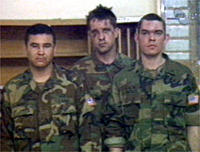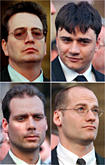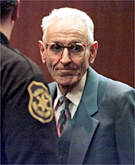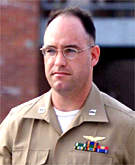
Update on the bombing of Yugoslavia: 1) Serbian forces captured three U.S. soldiers who were patrolling the Macedonian-Serbian border. There is a dispute over which side of the border they were on. The Serbs reportedly plan to court-martial the soldiers. The U.S. government called the soldiers' capture "illegal" and said it will hold Yugoslavia responsible for their safety. 2) A Kosovar Albanian leader, Ibrahim Rugova, was shown on Serbian television asking NATO to halt the bombing and meeting with Yugoslav President Slobodan Milosevic to sign a document urging a "political" solution to the Kosovo conflict. Skeptics are questioning whether Rugova has sold out or has been coerced and whether the meeting with Milosevic was actually videotaped before the bombing. 3) Reports indicate that the bombing has begun to inconvenience Serbian civilians and to cause shortages of supplies to Serbian forces in Kosovo. 4) The new endgame under consideration is to bomb Serbian forces until their capacity to fight in Kosovo is so impaired that NATO can easily recapture Kosovo and set up an ethnic Albanian enclave under NATO protection. (4/2/99)

Four white New York City police officers were arrested on charges of second-degree murder for firing 41 bullets at Amadou Diallo, an unarmed black man. He died of 19 bullet wounds. The officers pleaded not guilty, and their attorneys said the officers had fired their weapons in the "reasonable belief" that they were in danger. The case has triggered protests in New York, passionate defenses of law enforcement from Mayor Rudolph Giuliani and other supporters, and a national debate over police tactics in black and Hispanic neighborhoods. Johnnie Cochran and Barry Scheck are preparing a civil suit against New York City once the criminal trial ends. The high-minded spin: It's a conflict between public safety and civil liberties. The cynical spin: It's a conflict between whites and blacks. (4/2/99)
The FBI is tracking down the creator of the Melissa computer virus. The virus, which replicates itself in e-mail messages it automatically transmits from computers it has penetrated, infected more than 100,000 computers this week, causing significant problems throughout the Internet. Federal agents have now confiscated a computer in Orlando, Fla., that may contain clues to the virus's author, and they have secured a court order to obtain apparently confidential information from America Online, since an AOL account seems to have been used to launch the virus onto the Internet. (4/2/99)
The Dow Jones industrial average closed above 10,000 for the first time. This marked a 30 percent rise in the last seven months and a 300 percent rise since 1990. Newspapers wheeled out prepackaged articles boasting about the breadth of stock ownership among U.S. households and the growing dominance of U.S. companies in the world economy. The pessimistic spin: Asia and Latin America are still a mess; U.S. stock valuations are completely out of whack; the Internet investment mania will burst any day now; and the Dow will collapse. The optimistic spin: That's what pessimists have been saying for a decade. (4/1/99)

The University of Connecticut won its first NCAA men's basketball championship. UConn beat the consensus favorite, Duke, with outstanding defense and hot shooting. Although observers agreed it was one of the best-played finals in recent memory, the TV audience fell to a record low. Sportswriters credited UConn's victory to its refusal to be intimidated by Duke's reputation. The New York Times spin: Duke's defeat demonstrates the price of arrogance. The counterspin: UConn's victory demonstrates the power of arrogance. (4/1/99)
New York authorities are sorting out an interracial embryo mix-up. A white woman and a black woman went to the same clinic for in vitro fertilization. The black woman didn't get pregnant, but the white woman gave birth to two children, one white and one black, who are now three months old. Once the black child's parentage was ascertained, the black couple sued the clinic. This week, the white couple relinquished the black child to the black couple. The spins: 1) What is in vitro fertilization doing to our concept of parenthood? 2) Would the media be making such a fuss over this story if all the kids and parents were the same color? 3) Would the mix-up have been discovered if all the kids and parents were the same color? 4) How often do these mix-ups go unnoticed? (4/1/99)

Dr. Jack Kevorkian was convicted of second-degree murder. He faces 10 years to life in prison. The shallow analysis: The case was open and shut, since Kevorkian taped the incident (in which he administered a lethal injection to a terminally ill man, with the man's consent) and had the tape aired on 60 Minutes. The sophisticated analysis: Kevorkian tried to make the trial a political debate over assisted suicide, but the judge and jury refused to go along. Kevorkian's spin: He's a martyr for the assisted suicide movement. The conservative spin: His conviction proves that assisted suicide is murder. The dull liberal spin: He's an embarrassment to the assisted suicide movement and good riddance to him. The clever liberal spin: His conviction shows that if people can't get assisted suicide legally, they'll turn to murderers such as Kevorkian. (3/29/99)

The navigator of the Marine jet involved in last year's Italian ski lift accident, Capt. Joseph Schweitzer, is pleading guilty to obstruction and conspiracy charges. The charges relate to his alleged destruction of an on-board videotape that recorded the accident. The interesting question now is whether the plea deal means that the navigator will testify against the pilot (who was acquitted of manslaughter in the incident by a military court several weeks ago) on similar obstruction and conspiracy charges. (3/29/99)
An Ohio town has banned the use of cell phones while driving. The ordinance allows exceptions if the car is in "park" or if the driver keeps both hands on the wheel (e.g., by using a speakerphone). It was prompted by an accident caused by a cell phone user who wasn't paying attention to the road. This is believed to be the first such ordinance in the nation. Similar legislation has reportedly been considered in other states. (3/29/99)
For more Kosovo coverage, click here.
